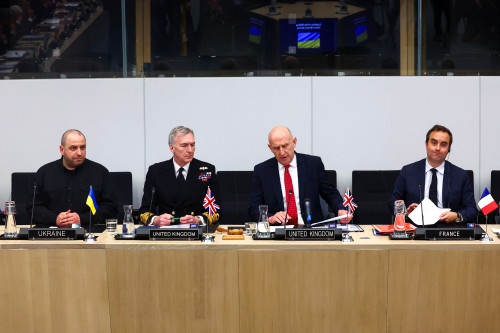By Andrew Gray and Benoit Van Overstraeten
BRUSSELS (Reuters) – Defence ministers from some 30 countries met in Brussels on Thursday to discuss a “reassurance force” for Ukraine in the event of a ceasefire in the war with Russia but key questions about its mission and any U.S. support remained unanswered.
The gathering at NATO headquarters was the latest in a series of meetings of the “coalition of the willing” of mainly European nations, led by Britain and France, on how they could cement peace if the U.S. brokers a halt to the fighting.
“Together we’re stepping up as one, ready to secure Ukraine’s future following any peace deal,” British Defence Secretary John Healey said at the start of the meeting.
“We advance the momentum of that planning here today, planning to put Ukraine in the strongest possible position, to protect its sovereignty and to deter any further Russian aggression.”
Many senior European officials assess that Russian President Vladimir Putin is not interested in halting his invasion but they are keen to show U.S. President Donald Trump that they are ready to play their part if his outreach to Moscow pays off.
Trump has made clear he expects Europeans to secure any peace that may result from his administration’s talks. Ukraine has said it is ready to accept a ceasefire while Russia has said it needs answers to multiple questions before it can decide.
European nations say they are ready to step up but would likely need assurances that U.S. forces would come to their aid and help with logistics and intelligence to deploy to Ukraine. Trump has so far declined to provide such assurances.
Arriving at the meeting, several ministers said they needed more clarity on issues such as the precise mission of any reassurance force and its rules of engagement before they could decide whether to contribute troops.
“I don’t exclude the possibility that Sweden is going to participate, but there’s a number of questions that we need to get clarified,” Swedish Defence Minister Pal Jonson said.
Dutch Defence Minister Ruben Brekelmans said it was important to discuss how a force would operate in different scenarios, such as any escalation by Russia, and how it might operate with a potential ceasefire monitoring force.
“It’s important that there is a clear picture on what such a mission would entail, and then we can also have our national decision-making process,” he said.
(Additional reporting by Lili Bayer; Editing by Alison Williams)


